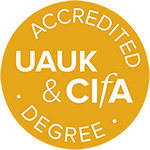Current filters applied:
- (-) Remove Africa filter Africa
- (-) Remove Other Prehistory filter Other Prehistory
Displaying 12 projects
Co-production Networks for Community Heritage in Tanzania.
Coastal Origins: Earliest human occupation of the shoreline
EHSCAN is a Horizon-MSCA-2022-PF scheme Fellowship Funded by UKRI and hosted by the McDonald Institute for Archaeological Research, University of Cambridge. The aim is to understand the cultural dynamics and transmission means of material culture in North Africa during the Early Holocene period (~...
Farmers at the Shoreline is a British Academy-funded project to survey and excavate coastal shell midden sites associated with the earliest black farming communities in South Africa. The project will locate cryptic archaeological sites in iSimangaliso Wetland Park in KwaZulu-Natal, one of the few...
How did our ancestors walk? Perhaps the greatest challenge that this question has posed in the past, is the lack of methodological applications in which no study has previously reconstructed how our ancestors moved using biomechanical modelling techniques. We need to consider not just individual...
In Africa is a five-year research programme to investigate the origins of our species - Homo sapiens - and its diversity in Africa, and aims at making new discoveries of early human fossils, archaeological sites and their environmental context.
Image: Ancient pastoralist settlement viewed from the air, Amboseli, Kenya. Photo: P. Lane. Mapping Africa's – Endangered Archaeological Sites and Monuments (maeasam.org) project aims to identify and document endangered archaeological heritage sites across Africa using a combination of remote...
MedAfrica Project - Archaeological deep history and dynamics of Mediterranean Africa, ca.9600-700 BC
This project sets out to produce a comprehensive, problematised synthesis and interpretation of long-term social and economic dynamics along Mediterranean Africa during the Holocene (9600-700 BC).
As part of the international campaign to salvage sites threatened by construction of the second Aswan High Dam in southern Egypt, coordinated by UNESCO, researchers from Sweden, Norway, Denmark and Finland collaborated on a series of archaeological campaigns between 1960 and 1964. Known as the...
The Rising from the Depths Network aims to identify ways in which the marine and maritime cultural heritage of Kenya, Tanzania, Mozambique and Madagascar can be used to benefit coastal communities in these countries. Many of these communities are among the poorest in the region and are especially...
Cambridge is home to world-leading researchers across archaeological science, technical art history and heritage science, based at Department of Archaeology, the Fitzwilliam Museum, and the Hamilton Kerr Institute, among others. There are multiple synergies across these institutions in terms of...
Traumatic death affects our daily life, but how did traumatic mortality affect human behaviour from an evolutionary perspective? TRAUMOBITA aims to understand how traumatic mortality among prehistoric humans shaped our behaviour during the Late Pleistocene to the Middle Holocene. Confirming that...


